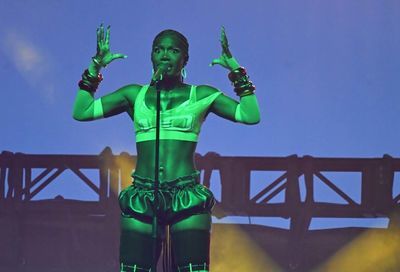‘Bottoms’ Review: Fighting for Sex
Emma Seligman's sardonic and thrillingly dark teen sex comedy is driven by a pair of manipulative high school lesbians.

One silver lining of the early pandemic? As studios delayed their high-profile releases, small films and first-time filmmakers had a rare chance to get noticed. And no young filmmaker emerged from the fog of 2020 quite like NYU grad Emma Seligman, whose debut feature, the unabashedly Jewish panic attack Shiva Baby, seemed almost custom-made for that claustrophobic moment.
Filmed in minimal locations on a $200,000 budget, Shiva Baby was wholly distinctive in its twist of awkward comedy and psychological horror and became a breakout role for comedian/actress Rachel Sennott. The film quickly resonated with an audience of quarantined cinephiles. It was clear a studio would give Seligman a far bigger budget for her next project. The question was what she would do with such a budget.
The answer is Bottoms (★★★☆☆), a sardonic and thrillingly dark teen sex comedy, which Seligman, now 28, wrote with Sennott, who stars alongside Ayo Edebiri (The Bear). Set in the faux-progressive environs of a football-loving town, the film taps into a long lineage of high school classics — the high-stakes horniness of Fast Times at Ridgemont High, the violent humor of Heathers, the social stratification of Mean Girls, the cheerleader satire of Bring It On and But I’m a Cheerleader — yet revels in a caustic comic vision that is unmistakably Seligman’s own.
It’s also a defiantly gay high school flick, though Seligman is uninterested in portraying queer teens as the usual vulnerable, tender victims. Instead, Sennott and Edebiri play PJ and Josie as two lesbian high schoolers who are more manipulative than helpless. They are best friends yet social outcasts and sexually inexperienced.
PJ (Sennott, at her diabolical best) is the bossier of the two, prone to vulgar one-liners (“We’re getting in the cooch — and we’re getting wet!”) and desperate to fulfill her fantasies with a cheerleader crush. Josie is quieter, but has a hyper-vivid imagination she can use to deceive others.
After an altercation with a star football player gets them scolded by the principal — “Stay in your lane until you’re munching beaver at Wesleyan,” he orders — the two friends invent a white lie about running a self-defense class. As the idea takes hold, they recruit a fellow nerd (Ruby Cruz) and start an actual fight club (girls only) under the cynical guise of female empowerment.
Their real motives are hornier: seducing the hot cheerleaders into hooking up with them. A gullible teacher (Marshawn Lynch), eager to trumpet himself as a male feminist, agrees to sponsor their club, and the pretty girls soon swoon over PJ and Josie’s faux-solidarity and phony tales about having served time in “juvie.”
As the violent hijinxs intensify, Seligman puts her $11 million budget to use with a stylish fight montage, a fiery car explosion, a gratuitously violent football-field climax, and some lavish needle drops. (Bottoms wants to do for “Total Eclipse of the Heart” what Stranger Things did for “Running Up That Hill.”) Meanwhile, PJ and Josie’s plan goes off the rails when members of the football team learn the truth and seek to expose the two friends, a story trajectory that feels frustratingly conventional.
The plot revelations, however, aren’t what makes Bottoms distinctive. It’s the screenplay, which crackles with Seligman and Sennott’s ruthless skewering of feel-good feminist platitudes.
In Shiva Baby, one of the most quotable exchanges was a contemptuous line about the main character’s disinterest in being “a girlboss.” In Bottoms, that contempt radiates constantly, as when PJ and Josie feign concern about the school’s “lack of female solidarity” or assure their teacher (whose extremely divorced status becomes a running gag) that sponsoring the club is “a great way to be an ally.” In the film’s scathing satire, those who cling to cringey feminist slogans are either suckers or self-serving cynics.
Bottoms is fluent in the extremely online humor of mocking social justice buzzwords and empty allyship from the left, even if the film itself isn’t particularly online. (With its normcore costumes, it almost feels like a period piece: The script does not acknowledge TikTok or Instagram, and nary an iPhone appears onscreen.)
It works because, like its eighties ancestor Heathers, Bottoms does not shy away from skewering sensitive subjects from an angle of absurdism. Its satire is barbed, its humor relentlessly dark. Along the way, we get jokes about bulimia, divorce, teen suicide, men needing therapy, bombs, Holocaust denial, feminism having been invented by Gloria Steinem, assault, stalking, and plenty more.
It’s a daring and frequently hilarious script, which makes it all the more frustrating that the third act gets bogged down in high-octane stunts and late-developing plot machinations. Seligman expressed in a recent New Yorker interview that she doesn’t want to make low-budget indies forever, and Bottoms is certainly a long way from the microbudget intimacy of Shiva Baby. But its action set pieces feel clunky and forced, like the director is already auditioning for a bigger film.
Back in 2020, when Bottoms was just a screenplay, Seligman described it as “a campy queer high school comedy in the vein of Wet Hot American Summer.” Like that eternally horny summer-camp classic, Bottoms is at its funniest when it doesn’t overexplain itself and simply lets us hang out with its characters, for whom getting laid is an all-consuming, almost biblical quest.
Bottoms, Rated R, opens nationwide on Friday, Sept. 1, including Washington, D.C. For tickets, visit www.drafthouse.com or www.fandango.com.
Support Metro Weekly’s Journalism
These are challenging times for news organizations. And yet it’s crucial we stay active and provide vital resources and information to both our local readers and the world. So won’t you please take a moment and consider supporting Metro Weekly with a membership? For as little as $5 a month, you can help ensure Metro Weekly magazine and MetroWeekly.com remain free, viable resources as we provide the best, most diverse, culturally-resonant LGBTQ coverage in both the D.C. region and around the world. Memberships come with exclusive perks and discounts, your own personal digital delivery of each week’s magazine (and an archive), access to our Member's Lounge when it launches this fall, and exclusive members-only items like Metro Weekly Membership Mugs and Tote Bags! Check out all our membership levels here and please join us today!




























You must be logged in to post a comment.